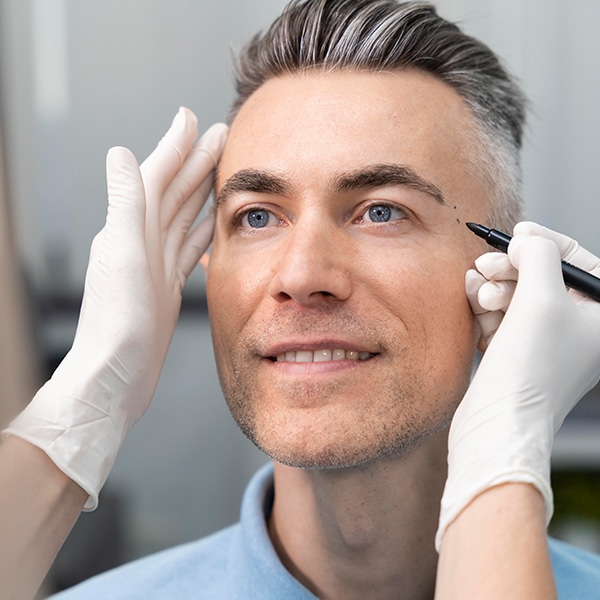Your Guide to Plastic Surgery
Plastic surgery is a medical specialty focused on the correction or restoration of the form and function of a specific body part. When you hear “plastic surgery”, the first thing that comes to mind is likely cosmetic surgery. However, most plastic surgery is not performed for cosmetic reasons.
Plastic surgery includes reconstructive or corrective surgery, including hand surgery, burn treatment, and microsurgery. While plastic surgery techniques have come a long way since ancient times, the basic principles remain the same: to restore function or improve appearance.
If you’ve been wondering if plastic surgery or any other procedure is right for you, call (661) 808-4070 or fill out the contact form to book a consultation. Dr.Freeman will answer any questions you have about plastic surgery in Bakersfield.

The History of Plastic Surgery
Plastic surgery and its many forms have been around for a long time. According to Sanskrit texts, plastic surgery traditions date back over 2000 years with references to reconstructive procedures like nasal reconstruction. The ancient Egyptians were also known to perform simple forms of plastic surgery, as evidenced by their skill in repairing damaged noses and breasts.
Sir Harold Gillies, an otolaryngologist, is considered the modern father of plastic surgery. Gillies and his team performed thousands of surgeries on soldiers who had been disfigured by facial injuries during World War I. By the mid-20th century, plastic surgery was an established part of mainstream medicine, and new techniques have developed over time. Today plastic surgery is more popular than ever, with over 16 million plastic surgery procedures performed in the United States each year. Whether you’re considering surgery for cosmetic or reconstructive purposes, there are a number of things to keep in mind before making your decision.
Education Requirements For Plastic Surgeons
Plastic surgeons must complete a four-year undergraduate degree, followed by four years of medical school and a minimum of six years of plastic surgery residency training. Plastic surgeons who wish to perform cosmetic surgery must complete an accredited plastic surgery residency program and pass the plastic surgery board exam.
In addition, many plastic surgeons choose to complete a fellowship in cosmetic surgery, which typically lasts one year.
Surgeons who wish to perform reconstructive surgery may choose to complete a microsurgery fellowship, which typically lasts one to two years.
Certification for Plastic Surgeons
To become a board-certified plastic surgeon, plastic surgeons must
- Complete an accredited plastic surgery residency program
- Pass written and oral exams administered by the ABPS
- Be licensed to practice medicine in the United States
- Complete at least one year of plastic surgery fellowship training
- Maintain their certification by completing continuing medical education (CME) requirements and passing recertification exams every ten years.
Types of Plastic Surgery
Plastic surgery is a broad field that encompasses many different aspects. Some of the disciplines covered are:
Cosmetic Procedures
A procedure that is performed to improve the patient’s appearance but does not involve any functional correction. The vast majority of cosmetic procedures are elective, meaning they are chosen by the patient for reasons that are aesthetic rather than medical.
Cosmetic surgery procedures can
- Improve your appearance and self-confidence
- Remove wrinkles, blemishes, or other signs of aging
- Enhance or enlarge breasts, hips, buttocks
Common procedures include:
- Breast augmentation (breast implants)
- Brow lift
- Eyelid surgery
- Facelift
- Nose reshaping
- Chin surgery
Reconstructive Plastic Surgery
A surgical procedure that is performed to correct or restore function to a particular area of the body. Reconstructive surgery is usually performed to improve the function of a body part that has been damaged by injury, disease, or birth defect.
Reconstructive surgery can
- Restore function to a body part after disease
- Correct a birth disorder or congenital defect
- Repair scarring or burns
- Correct facial bone fractures and breaks
Common reconstructive procedures include:
- Breast reconstruction
- Orthognathic surgery
- Correction of physical defects
- Cranio-maxillofacial surgery
- Laceration repair
- Treatment of complex wounds
Microsurgery
A specialty that uses an operating microscope for the surgical correction of problems too small to be corrected by the naked eye. In microsurgery, tiny incisions are made, and delicate instruments are used to repair or remove structures that are too small to be seen without magnification.
Common microsurgical procedures include:
- Tendon and nerve repairs
- Arterial and venous repairs
- Free tissue transfers
- Skin grafting
- Reconstruction of the eyelids, earlobes, and lips
Hand Surgery
A specialty that treats conditions and injuries of the hand, wrist, and forearm. Hand surgeons are trained in plastic surgery and orthopedic surgery and often treat patients with complex problems requiring both surgical specialties.
Common procedures include:
- Carpal tunnel release
- Tendon repair
- Arthroscopy
- Fracture repair
- Nerve repair
- Wrist fusion
- Total joint replacement
Craniofacial Surgery
A specialty that treats congenital and acquired deformities of the head, face, and neck.
Common craniofacial surgery procedures include:
- Cleft lip and palate repair
- Correction of facial deformities
- Treatment of craniofacial trauma
- Craniosynostosis surgery
Burn Surgery
A surgical specialty that treats patients with severe burns. The goal is to restore function and appearance of body parts damaged or affected by burns.
Common burn surgery procedures include:
- Skin grafts
- Tissue expansion
- Flap surgery
- Scar revision
Risks of Plastic Surgery
As with any surgery, there are risks associated with plastic surgery. These risks will be discussed with you during your consultation. Be sure to ask your surgeon about the risks and how they can be minimized.
Some of the more common risks include:
- Anesthesia complications
- Bleeding
- Infection
- Nerve damage
- Scarring
- Skin necrosis (death)
- Ulceration
- Unfavorable cosmetic results
7 Things to Keep in Mind
When considering surgery, it is important to
- Find a plastic surgeon certified by the American Board of Plastic Surgery (ABPS).
- Make sure your plastic surgeon has experience performing the specific procedure you are considering.
- Ask to see before-and-after photos of patients who have undergone the procedure you are considering.
- Be sure to ask about the risks and potential complications of the procedure you are considering.
- Make sure you are healthy enough for surgery.
- Have realistic expectations about the results of surgery.
- You should feel comfortable asking your plastic surgeon questions and expressing your concerns.
Body Dysmorphic Disorder
BDD is a mental disorder that causes people to focus excessively on their appearance and to have distorted perceptions of how they look. People with BDD often think about their appearance for hours each day and can spend hours looking in the mirror. They may compare their appearance to other people’s and feel that they don’t measure up. They may pick at their skin or obsessively check for flaws. People with BDD often seek plastic surgery to correct perceived flaws, but surgery cannot always correct these flaws or relieve the anxiety associated with them. In fact, surgery may sometimes make BDD symptoms worse. For this reason, it is important that plastic surgeons screen patients for BDD and carefully assess their expectations before performing surgery.

The Best Choice for Plastic Surgery in Bakersfield
Plastic surgery is a decision that should not be taken lightly. Before undergoing any type of surgery, there are many factors to consider, including the risks, benefits, and costs. If you’re considering any type of plastic surgery procedure in Bakersfield, book a consultation with Dr. Freeman. He will be happy to answer your questions and concerns and discuss the best way forward for you. Call (661) 808-4070 or fill out the contact form to book a consultation.
